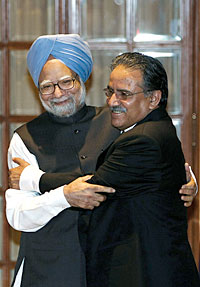 |
Convincing the Indians of the need to help salvage the Nepali peace process is getting harder. This is because of reasons both internal to Nepal, and the broader context in which Delhi has to make certain fundamental decisions.
The Indian state today is facing two big issues that will have long-lasting consequences for its own stability and for Nepal.
The first is the growing tension with China. Strategic circles are agog with speculation about whether the global system can accommodate two rising powers simultaneously and peacefully--especially when they have fought a bitter war, share contested borders, and compete for resources and power.
The past fortnight has seen Beijing ratchet up the rhetoric on Man Mohan Singh's Arunachal visit.Uncharacteristically, India hit back, asking China to stay away from 'Pakistan-occupied Kashmir'. Delhi has already given the go-ahead to Dalai Lama to visit Arunachal, and has now decided not to issue workvisas to unskilled Chinese workers.
Analysts have offered various explanations for the stand-off. Whatever the reason, this is not about to descend into a conflict. Both powers recognise the incentives for cooperation. The two Prime Ministers meet in Thailand soon. Foreign office spokespersons are already toning down the rhetoric. India and China just signed an MOU on climate change. Trade is skyrocketing.
But the trust deficit has sharply increased.
Right in the middle of this, with either a perfect, or disastrous, sense of timing, Mr Pushpa Kamal Dahal went off to China. We do not know what Beijing told him--to behave, be flexible and finish the peace process or to agitate and take on India with Chinese support. But what the visit has done is prove to sections in Delhi that the Maoists cannot be trusted.
The second challenge for India is 'Operation Green Hunt', a massive security offensive spread across central and eastern India against the Communist Party of India (Maoist). Paramilitary troops with heavy weaponry are being deployed with the support of Air Force helicopters. There are plans to launch coordinated attacks to recover the forest known as Abuj-Marh, which serves as a base area for the Maoists, and then move into other districts in Chhattisgarh. The idea is to 'clear areas of Maoists, assert state control, and begin development work'.
The government's plan is opposed by anthropologists, activists and even some security specialists. They point out that a military offensive will not address the root issues of justice, displacement and tribal exploitation, and will only lead to 'collateral damage', impose development models that people do not want, and alienate them even more.
Across the board, however, a common refrain has been, "Why don't our Maoists imitate the Nepali Maoists? Look, they gave up violence and participated in elections." Ironically, even BJP leader--who opposed our peace process--have been making these arguments.
The Indian establishment could see the utility of getting the Nepali Maoists back into the power structure to project them as a 'role model' to their Indian comrades. Or it may feel that their utility is now over. The role model argument has been made but the Naxalites, in any case, are not buying it. Nepali Maoists are already over-ground, and can be kept trapped in the process without offering them real power.
Against this national and regional backdrop, Delhi has to answer two questions.
Can it live with a Maoist-dominated power structure in Nepal--even though they have not undergone the prescribed 'course correction', continue to court China, maintain an all-embracing party structure, and stick to their ideological line? And can it live with a radically different Nepali state--where political elites may not be as pliable to Indian concerns, where multiple 'autonomous' provinces exist that may embarrass India, for instance by declaring the caste system a human rights abuse from a UN platform?
All options are on the table but it would be a surprise if the answer to either question were 'yes'. For security establishments, the prospect of 'controlled instability' in familiar settings usually outweighs the risks of the unknown. Nepal's political future is locked in precisely that dilemma.
REAS ALSO:
Hu cares? - FROM ISSUE #473 (23 OCT 2009 - 29 OCT 2009)



